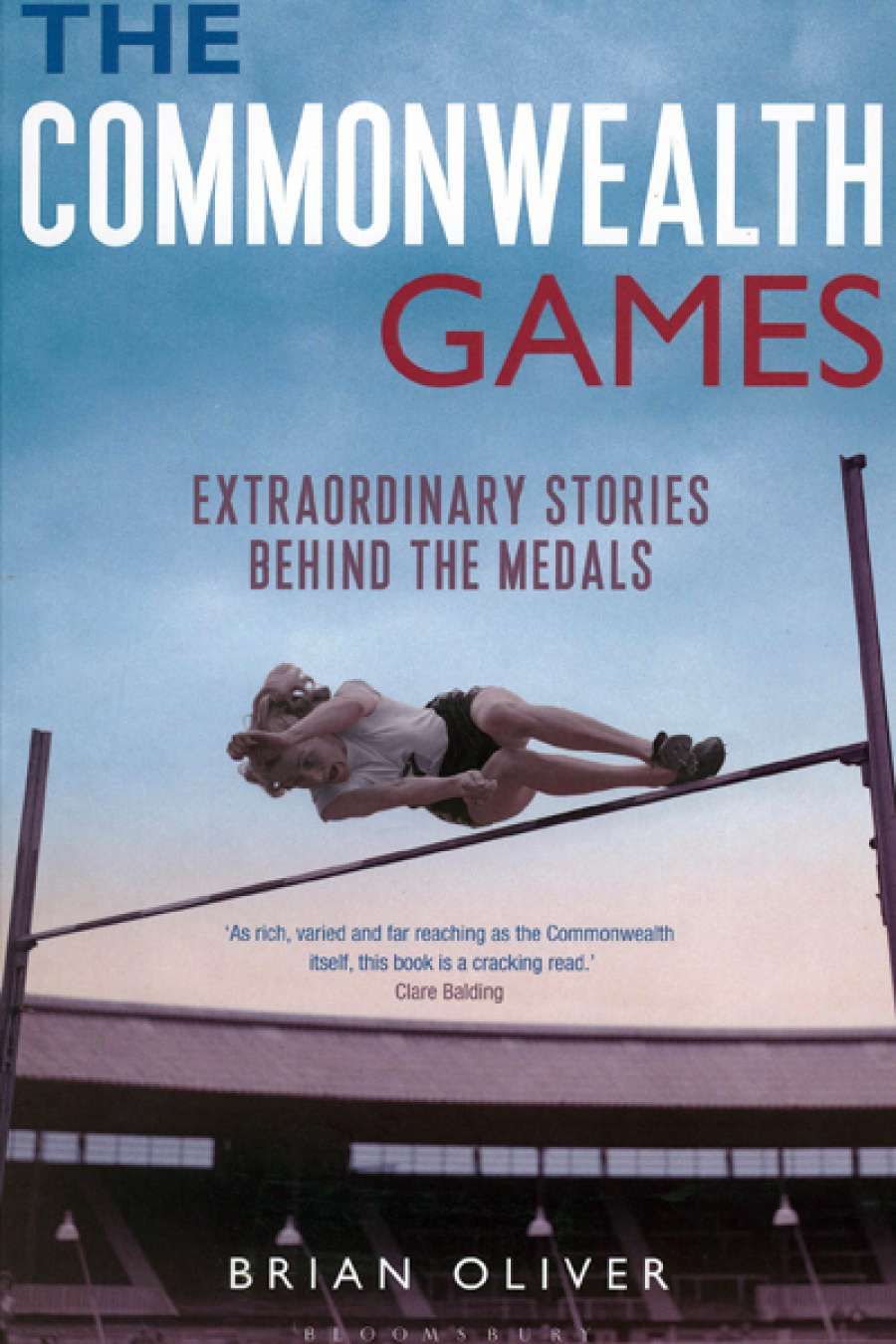
- Free Article: No
- Contents Category: Sport
- Review Article: Yes
- Article Title: Another lap!
- Online Only: No
- Custom Highlight Text:
The Commonwealth Games, like the Commonwealth of Nations, often seem irrelevant. I intended to declare my bias in this review when I found author Brian Oliver saying the same thing on the first page of his introduction. But, as the author points out, the Games have survived the political, cultural, and sporting odds for more than eighty years and have a rich sporting history.
- Book 1 Title: The Commonwealth Games
- Book 1 Subtitle: Extraordinary stories behind the medals
- Book 1 Biblio: Bloomsbury, $29.99 pb, 210 pp
We are certainly made aware of Games founder ‘Bobby’ Robinson’s assertion regarding the inaugural event in Hamilton, Ontario, in 1930 – ‘These Games will be fun’. Similar remarks were made about those held at Cardiff (1958) and Christchurch (1974). But the ‘Friendly Games’ title was also applied to the Melbourne Olympics (1956), despite the infamous ‘Blood in the Water’ water polo match between Hungary and the USSR. Moreover, the Sydney Olympics (2000) represented this nation at its best and was later described by Sebastian Coe as ‘the benchmark for the spirit of the Games’.
 The Games’ founding father, Melville Marks ‘Bobby’ Robinson
The Games’ founding father, Melville Marks ‘Bobby’ Robinson
Oliver is on surer ground when he explores the subtitle of the book, ‘The extraordinary stories behind the medals’. Indeed, they are extraordinary. On the opening day of the Hamilton Games, an incredible blunder by an amateur official almost cost New Zealand runner Billy Savidan the gold medal in the six-mile event, which was run in searing heat over twenty-four laps at the Civic Stadium. Savidan was informed that he had one lap to complete instead of two.Staggering over the finish line, he was urged on: ‘Another lap!’ Fortunately, Savidan was able to find sufficient energy to restart and had a strong enough lead to wobble around the track one more time to claim victory.
This is an exciting beginning, and other stories follow: of Canadian journalist Robinson, who was so disgusted by American arrogance at the Amsterdam Olympics (1928) that he conceived and organised the first British Empire Games; of four-foot-ten-inch South African weightlifter Precious McKenzie’s triumph over adversity to win gold medals for both England and New Zealand in four Games; of the rivalry between champion breaststroke swimmers Adrian Moorhouse (England) and Victor Davis (Canada), followed by Davis’s premature death; of English marathon runner Ron Hill, a pioneer in understanding dietary requirements for long-distance events; of world-class Scottish swimmer Ian Black, who, without a coach and proper pool to train in, quit his sport aged nineteen; of Nigerian high jumper Emmanuel Ifeajuna, who won his country’s first gold medal at Vancouver (1954) and was executed by firing squad thirteen years later; and of Nauru weightlifter Marcus Stephen, whose gold medal win in Auckland (1990) transformed the sport in his country and the Pacific region.
These athletes will probably be unknown to most Australians, and there will be surprises for those who think of international swimming simply being dominated by us and the Americans. Both Davis and Moorhouse were world record-holders and Olympic gold medallists, but a most amazing record and one of the saddest stories was that of Black – a butterfly gold medallist at Cardiff and European champion in three events in 1958 – who was denied any real opportunity of greatness at the Rome Olympics in 1960 due to the inept administration of British swimming.
Some Australian readers might feel short-changed, for only one and a half chapters are devoted to Australian athletes, and both come near the end of the book. In the first of these, Oliver writes, ‘Powerful, domineering men made life very hard for Australia’s greatest sportswomen’; he cites Dawn Fraser and Kathy Watt, both feisty personalities and grand competitors. In the second, Englishman Roger Bannister defeats John Landy in the miracle mile at Vancouver, a contest which can fairly be described as ‘the race of the century’.
 London Commonwealth Games (1958)
London Commonwealth Games (1958)
In The Commonwealth Games, Oliver paints a big picture on a broad canvas. There are other reminders that Commonwealth runners have often been the world’s best. When Ron Hillwon the marathon at Edinburgh in 1970, the world’s three fastest runners – Australian Derek Clayton, Canadian Jerome Drayton, and fellow Englishman Bill Adcocks – were his opponents. And when Tanzanian Filbert Bayi beat New Zealander John Walker and Kenyan Ben Jipcho to take the 1500 metres at Christchurch (1974), Bannister described the race as ‘the greatest run I have ever seen’. While Australia, with 2080 medals, leads England (1838) and Canada (1388), it should be remembered that no less than fifty-five countries appear on the list of medal winners. Some of the absolute pleasures of the The Commonwealth Games are the lightest brush strokes. Australia might lead the weightlifting medal tally with 150, but tiny Nauru, with a pre-detention centre population of 9500 in 1998, had fifty-four weightlifters in international competition – more than Russia, China, Bulgaria, and Greece, which have traditionally dominated the sport.
Brian Oliver’s history is a fine complement to this year’s Glasgow Games.


Comments powered by CComment